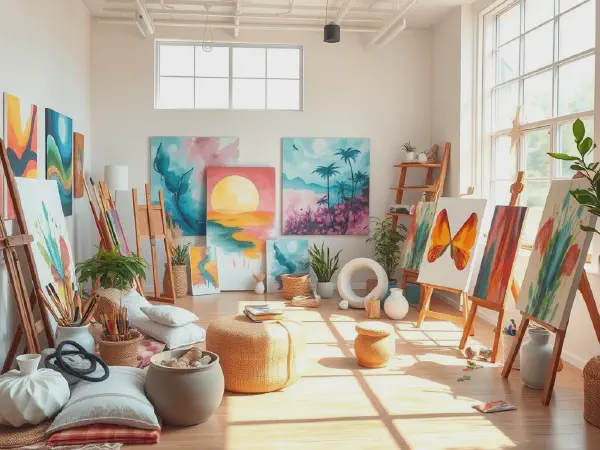Exploring Art Therapy in Addiction Recovery in Columbus

Art Therapy in Addiction Recovery in Columbus
Art therapy is emerging as a powerful tool in the field of addiction recovery, particularly in Columbus, where individuals seeking recovery are finding solace in creative expression. This holistic approach not only helps in healing emotional wounds but also aids in understanding and navigating the complexities of addiction. By incorporating art therapy into their recovery routines, individuals can explore their feelings, develop coping strategies, and engage in self-exploration, making it an invaluable component of addiction treatment in Columbus.
In Columbus, art therapy has gained traction among rehabilitation centers and support groups as a beneficial adjunct to conventional addiction treatments. This method fosters a non-verbal form of communication, allowing those in recovery to express emotions and experiences that might be difficult to articulate verbally. As art therapy in addiction recovery in Columbus continues to evolve, practitioners and clients alike are discovering its potential to enhance the healing process and support personal growth during recovery.
The benefits of art therapy extend beyond mere self-expression. In Columbus, art therapy in addiction recovery programs is designed to address the emotional, psychological, and social aspects of addiction. Providing a safe space for individuals to explore their feelings through various forms of art, this therapeutic practice can significantly improve one's mental health, leading to better overall outcomes in recovery. Through engagement in creative activities, individuals are encouraged to form connections with others and foster a sense of community, an essential component of lasting recovery.
By participating in art therapy, individuals on the path to recovery can not only confront the underlying issues that contribute to addiction but also build resilience in the face of challenges. Columbus has seen a surge in interest and resources dedicated to integrating art therapy into rehabilitation efforts, making it a vital aspect of addiction recovery for many. As awareness of this therapeutic approach expands, so does the need for accessible programs and trained professionals who can guide individuals through artistic exploration as they heal.
Overall, art therapy in addiction recovery in Columbus is proving to be an effective approach that resonates with many recovering individuals. By providing creative outlets and fostering emotional growth, art therapy helps bridge the gap between struggles with addiction and successful recovery. As Columbus continues to embrace this innovative therapy, the positive impact on the community becomes increasingly clear, highlighting the importance of creativity in the healing process.
Benefits of Art Therapy
Emotional expression through art is perhaps one of the most significant benefits of art therapy. It provides individuals with a unique medium to express feelings that may be difficult to articulate otherwise. In Columbus, recovering individuals can use painting, drawing, and other art forms to visually represent their emotions, leading to greater self-awareness and emotional release.
Improving coping skills is another crucial aspect of art therapy. Through creative expression, individuals learn to manage their emotions and stress effectively. Art therapy in Columbus plays a vital role in aiding those in recovery to develop healthier ways of coping, diminishing reliance on substances and fostering resilience.
Art therapy can be a transformative tool in healing, as discussed in this insightful piece on supporting addiction recovery through art therapy: https://www.adler.edu/2021/07/06/supporting-addiction-recovery-through-art-therapy/.
Building self-esteem and confidence is one of the intangible yet powerful benefits of art therapy. Engaging in artistic activities allows individuals to explore their creativity and talents, leading to a sense of accomplishment. This newfound confidence is invaluable in the recovery process, particularly in Columbus, where self-image is often challenged by addiction.
Enhancing communication skills is an important goal of art therapy. Many individuals in recovery struggle to communicate their emotions or experiences effectively. By engaging in art therapy, they can improve these skills in a supportive environment, leading to more profound conversations and connections with peers and therapists during their recovery journey.
Promoting mindfulness and relaxation through art therapy can significantly aid in stress reduction and anxiety relief. In the bustling atmosphere of Columbus, art therapy provides a much-needed respite, allowing individuals to focus on their creative pursuits. Practicing mindfulness through art helps individuals reconnect with themselves and the present moment, which is crucial in addiction recovery.
Types of Art Therapy Techniques
Drawing and painting as therapeutic tools are foundational techniques utilized in art therapy. These methods encourage individuals to freely express their thoughts and feelings in visual forms, serving as powerful tools for empowerment and healing in addiction recovery.
Sculpture and three-dimensional art techniques allow individuals to engage with materials tactilely, enhancing the creative process. In Columbus, workshops offering these methods encourage individuals to explore their emotions through physical manipulation of clay, metal, and other materials, creating a deeply immersive therapeutic experience.
Digital art for emotional exploration is increasingly popular in modern art therapy practices. This technique enables individuals in Columbus to explore their feelings and thoughts through digital media, combining technology and creativity to foster emotional expression.
Group art therapy sessions facilitate shared experiences among participants, creating a sense of community and support. In Columbus, these sessions allow individuals in recovery to connect through shared artistic projects, leading to a supportive network that promotes healing and understanding.
Music and movement in art therapy can also be incorporated to further enhance emotional expression. Techniques such as dance, rhythm, and sound exploration allow individuals to embody their feelings physically, making it a dynamic and engaging form of therapy welcomed in Columbus's art therapy programs.
Art Therapy Programs in Columbus
Local institutions offering art therapy in Columbus are committed to providing comprehensive recovery services. Many rehabilitation centers are integrating art therapy into their programs, ensuring that individuals have access to this beneficial treatment option as part of their recovery journey.
Community workshops and support groups throughout Columbus also aim to make art therapy accessible to those in need. These programs often offer low-cost or free creative sessions, helping to reduce barriers to art therapy and support real community engagement in the recovery process.
Professional certifications for art therapists in Columbus ensure that practitioners are trained to deliver effective therapeutic services. Licensed professionals provide individual and group therapy, guiding clients through their artistic exploration for meaningful recovery outcomes.
Collaborative programs with rehabilitation centers focus on integrating art therapy into traditional treatment protocols. In Columbus, partnerships between local art therapists and addiction treatment facilities are creating innovative approaches to care, making recovery more holistic and engaging.
Success stories from Columbus residents highlight the transformative power of art therapy in addiction recovery. Many individuals share how creative expression has significantly impacted their healing journeys, illustrating the real-world benefits of combining art with traditional recovery methods.
Integrating Art Therapy with Traditional Recovery
Complementing 12-step programs with creativity allows individuals to explore their recovery journey through an artistic lens. Art therapy can help participants visualize their progress and connect with their emotions during the steps, making addiction recovery more relatable and engaging.
Holistic approaches to addiction treatment benefit from the inclusion of art therapy. In Columbus, many treatment centers are embracing a more integrative approach, combining traditional therapies with creative outlets to address the complex needs of individuals in recovery.
Therapeutic sessions with counselors often incorporate art therapy techniques, allowing for a more comprehensive treatment plan. Art materials can help facilitate communication during these sessions, providing a means for individuals to express their emotions and experiences effectively.
Peer support through artistic expression fosters a sense of belonging and understanding among individuals in recovery. Columbus programs focus on creating art together, enabling participants to share their stories and bond over shared experiences while developing valuable connections.
Mental health awareness in recovery highlights the essential role that art therapy plays in addressing both addiction and mental health challenges. Columbus communities aim to facilitate open conversations about mental health as they incorporate creative outlets into recovery practices.
Case Studies and Testimonials
Real-life stories of recovery through art provide compelling evidence of the effectiveness of art therapy in addiction treatment. Many Columbus residents share their journeys, showcasing how creative expression has catalyzed personal growth and healing.
Impact assessments of art therapy demonstrate significant improvements in emotional regulation, coping skills, and overall satisfaction in recovery. Data collected from Columbus programs highlights both quantitative and qualitative benefits of integrating art therapy into addiction treatment.
Personal journeys of Columbus residents reflect the diversity of experiences in art therapy. Each story reveals profound transformations, illustrating the therapeutic potential found within creativity and artistic expression during the recovery process.
Interviews with therapists and participants offer valuable insights into the practice of art therapy in Columbus. These conversations highlight the nuances, challenges, and rewards of utilizing creativity as a healing tool in recovery programs.
Long-term benefits of art therapy in addiction recovery pave the way for sustained healing and fulfillment. As Columbus continues to embrace art therapy as a viable component of recovery, the enduring impact on individuals and communities becomes evident.
